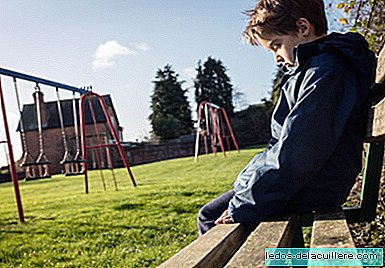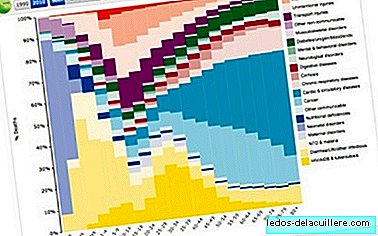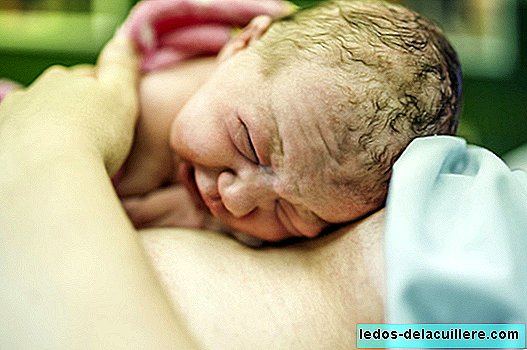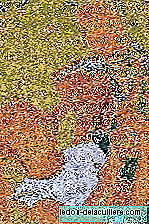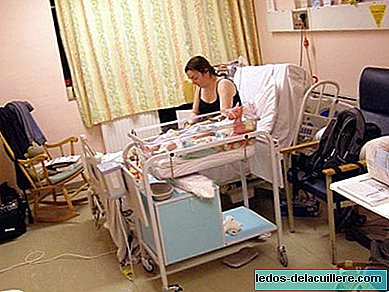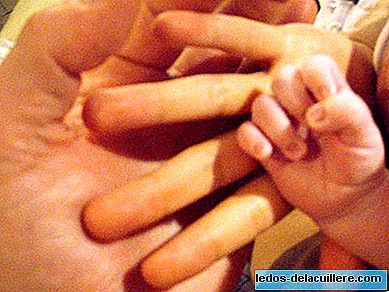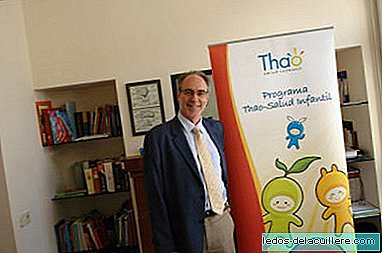
Today we interview Dr. Rafael Casas who is the scientific director of the Thao Foundation and national coordinator of the Thao program - Child Health. This organization's mission is the prevention of childhood obesity and the promotion of healthy lifestyle habits.
A few months ago we were talking about a study that alerted us about the appearance of the problem of childhood obesity at very early ages (from three to five years). Already then we wanted to tell you more carefully how Thao - Children's Health is developing in different municipalities.
And who better than Dr. Casas, Psychiatrist, expert in qualitative research and specialized in the health sector. His long experience in motivational studies and health strategies, make him the ideal professional to get closer to Thao - Children's Health. Peques and More.- What do you attribute from the Thao Foundation to the increase in cases of childhood obesity in our country?
Rafael Casas.- Indeed, in the last 10 years, obesity and overweight in childhood have increased alarmingly in Spain and in other countries around us. This is due to profound change that has occurred in the current lifestyle, which not only affects children, but the whole family.
We have an increasingly unhealthy diet: abandonment of the Mediterranean diet due to an unbalanced diet, an increasingly sedentary and passive way of life, with less physical activity. This leads to an imbalance between intake and caloric expenditure, that is, between what is eaten and what is burned. And according to my criteria as a psychiatrist, a lifestyle presided over by haste, stress, dissatisfaction and loss of relationship between people.
Parents are the main example for our sons and daughters. We influence and educate them through our way of feeding, we must try to eat with the family and share this very important moment of relationship, to discover that we are active and we like to play sports
PyM.- I would like you to briefly tell us what the Thao - Child Health Program consists of, and what its objectives are
R.C.- Thao-Child Health aims to prevent childhood obesity from the municipality, and it has been created and developed by the Thao Foundation, based in Barcelona. Promotes healthier eating and physical activity habits for children and their families, improve sleep hours and, more generally, favor the psychological environment and a better emotional relationship.
Thao is implemented from the municipality through the coordination of a municipal technician: the local coordinator. This is supported by a multidisciplinary local team that stimulates the involvement of key social actors, with the aim of influencing the environment of children, and their families. It is based on a coordinated proximity action plan, which is accompanied by an annual evaluation and constant communication, accompanied by characters called "the thaoines."
Thus, through the municipality, various actions are proposed that are planned in the form of “seasons”, mainly during the school year. So far, seasons dedicated to fruit, water, farinaceous, fruits and vegetables, physical activity, fish and seafood, and the current season have been developed to promote an economical, easy and healthy diet.
Other actions are, for example, the guide "The courtyard of my school", a compilation of old games, the "Thaobús", which encourages students to walk to school or the promotion of "Healthy Breakfast", so that the boys and girls start the day with a good breakfast and have a better school performance.
PyM.- How many Spanish municipalities have joined the Program? What are the ways to participate and what requirements must the municipalities meet?
R.C.- The Thao Program began in Spain in September 2007 in 5 pilot municipalities: San Juan de Aznalfarache (Seville), Castelldefels (Barcelona), Sant Carles de la Ràpita (Tarragona), Aranjuez (Madrid) and Villanueva de la Cañada (Madrid) .
Today, there are 79 municipalities in 8 autonomous communities that are implementing the Program, reaching about 247,000 boys and girls from 0 to 12 years. The requirements to adhere are that there is a firm political will of the mayor of the municipality and the government team. The number of inhabitants of the population does not matter, but the desire to start the project.
The implementation of the Program is formalized by signing an adhesion agreement with the Thao Foundation. In short, any municipality can be a Thao municipality.

PyM.- After evaluating the results, could you tell us by way of example how the Thao Program has modified habits and / or attitudes in any of the participating municipalities?
R.C.- The best evaluation of the actions will be their impact on changing habits and that will be reflected in a decrease in the prevalence of childhood obesity in the long term. Each year the Program weighs and measures all children between 3 and 12 years old to calculate their Body Mass Index (BMI) and determine what proportion of children are overweight. It also studies other indicators, such as waist circumference and the level of physical activity and quality of the food diet.
To demonstrate the effectiveness of the Thao Program, the longitudinal study of obesity prevalence and childhood overweight in the five pilot municipalities that started the Program in 2007 has been presented this year. After four years of Thao actions in these municipalities, the results tell us that there is already a slight change in the trend in the evolution of childhood obesity. The rate has decreased slightly, from 6.8% in 2007 to 6.3% in 2011. These results are very encouraging and encourage us to continue working on the line set by the WHO: slow the growth of childhood obesity .
PyM.- What do you know about the satisfaction of the participating population?
R.C.- To evaluate the application of the Thao Program, this year we have been able to add a new “process evaluation” tool to know the opinion of the local coordinators on the development of the Program in the municipalities. The evaluation has allowed us to know their degree of satisfaction with the national coordination, the response they receive from the population of their municipality, the problems and difficulties they have in developing the Program ... The assessments have been very positive and The answers obtained have given us many ideas to learn from the experience and develop the Thao Program better. Each municipality implements the Program differently, according to the existing resources and the willingness to intervene.
The Thao Program began in Spain in September 2007 in 5 pilot municipalities: San Juan de Aznalfarache (Seville), Castelldefels (Barcelona), Sant Carles de la Ràpita (Tarragona), Aranjuez (Madrid) and Villanueva de la Cañada (Madrid)
PyM.- Have you followed the example and model of some other country to develop this initiative?
R.C.- The Thao-Child Health Program has as background the Fleurbaix-Laventie Ville-Santé (FLVS) study and the French EPODE program (“Ensemble Prévenons l'Obésité des Enfants”).
The Fleurbaix Laventie Ville Santé study was started in 1992. The purpose of the study was analyze the eating habits of boys, girls and their families, measuring the effectiveness of the actions that were carried out thanks to the comparison with other cities where such actions were not performed. It was shown that actions in schools and in the community have a positive impact and can slow the progression of the prevalence of obesity and overweight in children.
The EPODE program was launched in January 2004 in 10 cities, in 10 French regions, its objective was to prevent the increase of excess weight of children from 5 to 12 years through a five-year prevention plan . Then it spread in 2007 to Spain (Thao-Child Health Program) and to Belgium (Viasano). In 2009, Greece launched the program under the name Paideiatrofi. Currently, the EPODE Program is called Vivons en Forme and has been extended to 226 cities, with more than 1,200,000 inhabitants involved.
Based on this experience, the Thao-Child Health Program was launched in Spain in 2007, which is designed and created taking into account the Mediterranean environment, our cultural characteristics and the diversity of our country.

PyM.- What responsibility do families have in preventing this problem? As parents, what aspects should we consider in the education of our children regarding obesity?
R.C.- For fathers and mothers, the first step is to become aware that it is necessary to eat in a more varied and balanced way, while incorporating physical activity into everyday life, as promoted by the Thao-Child Health Program.
Parents We are the main example for our sons and daughters. We influence and educate them through our way of feeding, we must try to eat with the family and share this very important moment of relationship, to discover that we are active and we like to play sports.
This is what parents can do to educate their sons and daughters to adopt healthier habits. It is also important to encourage them to play with their friends and have fun, and to sleep enough hours. And whenever possible, do it with them. If fathers and mothers have internalized good healthy living habits and constantly put them into practice, they will lead by example and their children will imitate them.
We have an increasingly unhealthy diet: abandonment of the Mediterranean diet due to an unbalanced diet, an increasingly sedentary and passive lifestyle, with less physical activity
PyM.- And finally, what responsibility does society have for reducing the indexes of this problem? On which entities should the main responsibility fall?
R.C.- The study Thao 2010-2011, the most recent, which analyzed a sample of 38,008 Spanish children between 3 and 12 years of age, offers data indicating an obesity prevalence of 8.3% and 21.7% overweight . This represents 30% of children with excess weight, which confirms that Spain is one of the countries with the highest rate of childhood obesity in Europe. These figures are alarming enough for political representatives to take action on the matter and invest more in health prevention and promotion policies.
Unfortunately, this is not yet happening with the intensity that we would like. Even so, in recent years an important job has been done.
Society is increasingly aware of this health problem and it is increasingly considered that It is not only a problem of the authorities, since to achieve some habits everyone's effort is important, from school, health professionals, sports centers, markets, associations of parents, youth, etc. Everyone can and should contribute their grain of sand to this important mission of creating a healthier and happier future society.
After the interview, we would like to thank Dr. Rafael Casas for collaborating with us, and we congratulate the Thao Foundation for its preventive work and dissemination of healthy habits. We also want the goal of eradicating this health problem to be gradually established in our society.
Images | Doctor Rafael Casas More information | Fundación Thao En Peques y Más | Eating as a family reduces obesity



